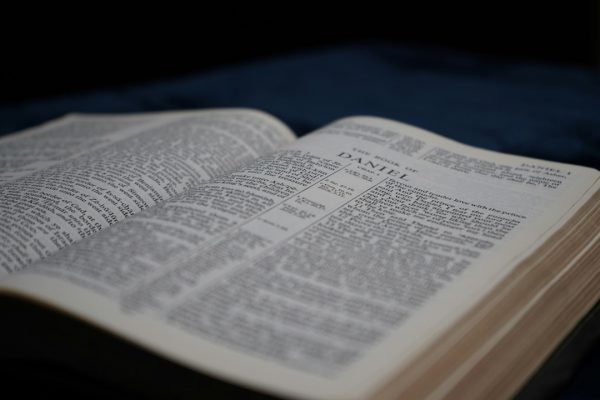
Everyone wants to be blessed and wants to live a blessed life. To use a simpler and synonymous phrase, we all want to be happy. The pursuit of happiness consumes our lives and influences virtually every decision we make. But what does it actually mean to be blessed? Scott Swain provides a helpful and comprehensive definition. Blessedness “refers to the state of being in which a person possesses goods (both objective and subjective) that are necessary for that person’s wholeness, fulfillment, and satisfaction.”1 For many, this state of happiness and fulfillment comes from things like fame, fortune, health, and love. If we can possess those things, then we can append #blessed to our social media posts.
But what does the Bible have to say about happiness? Where does it come from, and how do we get it? To answer these questions, we must begin with God.
The Blessed God: The Fount of All Happiness
Happiness begins in, comes from, and ends with the triune God. He is the source of all blessedness. In Paul’s first letter to Timothy God is described as the “blessed (happy) God” (1 Tim 1:11; 6:15-16). 17th century expositor William Burkitt explains that Paul uses the word “blessed” here
to signify thereby unto us, his transcendent mercy and excelling goodness, in that being infinitely happy in the enjoyment of himself and his divine perfections, and incapable of any profit from, or advantage by, his creatures, he was yet pleased to give us his Son, his gospel, his Holy Spirit, to qualify us for, and bring us to, the enjoyment of himself.2
Yes, he is the “praised” God in the sense that he receives the praise and honor of which he is worthy, but this phrase primarily stresses that God is blessed, or “happy,” in himself. This is the doctrine of divine blessedness.
Much of what we say about the God who dwells in unapproachable light (1 Tim 6:15-16) is simply affirming what he is not. God has no beginning or end (eternal); God cannot die (immortal); God is not one of many of gods or like any created thing (unicity); God does not depend on anyone or anything for life (aseity); God does not change (immutability), he has no body (immaterial), he has no parts (simplicity) or passions (impassibility), and he has no limits (transcendence) or restrictions (omnipresence). But the doctrine of divine blessedness involves something we can confidently say that God is: God is blessed. Blessedness is essential to who God is.
Divine blessedness is “the satisfaction of God as he reposes in, rests in, and rejoices in the beauty of his perfect being.”3 Because God is holy, full of infinite and unchangeable light, life, and love, his happiness is guaranteed. He does not become more or less blessed and cannot be anything but happy. He is self-sufficient and all-sufficient (Acts 17:24-25), absolutely delighting and resting in himself.4 He is eternally happy because he is who he eternally is (Ex 3:14).
Knowing and Enjoying the Happy God
Not only is blessedness something that God is, it is also something that he graciously shares with his creatures. This puts blessedness in the same category with other communicable attributes, such as love, goodness, and holiness. Swain sums it up well: “happiness consists in possessing, knowing, and enjoying the supreme and unsurpassable good, God himself, the blessed Trinity.”5 Along with love, goodness, and holiness, we can know, possess, and enjoy the happiness of the triune God! This is why the psalmist rightly declares that he has no good apart from God and that there is nothing on earth that he desires more than him (Ps 16:2; Ps 73:25). “In your presence there is fullness of joy; at your right hand are pleasures forevermore” (Ps 16:11).
While happiness, to some degree, is certainly found in the good gifts that God gives us in this present life, true, everlasting, and all-satisfying happiness comes from the triune God from whom all blessings flow (1 Tim 4:1-5). Swain reminds us that these gifts “point to the one who is the transcendent good and the object of transcendent delight: our true food, our true drink, our true husband (Ps. 45; John 3:29; 6:35, 55). The blessed Trinity is thus the source and end of all creaturely good.”6
The Blessed Gospel
Because God is blessed, and blessedness characterizes all he does, when God made the world, it was good and blessed. However, sin destroyed the goodness and blessedness of creation and mankind’s happiness of knowing and enjoying God. As a result, mankind pursues happiness, satisfaction, and fulfillment in anything but our good and blessed Creator (cf. Jer 2:12-13). We seek the gift rather than the Giver, only to sink into despair when our joy and happiness is not complete, unending, and all-satisfying.
But the good news is that Jesus, the eternal Son who has shared in the fullness of love, joy, and happiness with the Father and Spirit before the foundation of the world (John 17:5), came to restore us to fellowship with God and true blessedness. “These things I have spoken to you, that my joy may be in you, and that your joy may be full” (John 15:11; 17:13). He even endured the cross with joy so that could know fullness of joy that is found in the presence of the triune God (Heb 12:2). Christopher Holmes writes, “The marvel of marvels is that God communicates his profound goodness to us in creation and in Christ (and the Spirit) to make us perfect, and not to make himself perfect.”7 We can adapt this statement for our current discussion. The wonderful mystery of the gospel is that God communicates his blessedness to us in Christ and the Spirit to make us blessed, not to make himself blessed (for he is already infinitely and perfectly happy). In other words, God is the Blessed and Blessing God
Those who belong to Jesus are truly blessed because we have communion with God. Those whom he justified he will one day glorify (Rom 8:29-30). While we experience this blessedness in part as pilgrims and exiles in this fallen world, we know that one day we will one day participate in and enjoy the mutual love and eternal delight shared by the Father, Son, and Holy Spirit (as far as our creaturely capacities will allow). We will forever enjoy the infinite blessedness of our triune God when we him “face to face” (1 Cor. 13:12; Rev. 22:1-5). This is our “blessed hope” (Titus 2:13). The happy God, who dwells in unapproachable light, will one day dwell with us, and we will drink from the well of happiness that will never run dry.
The Blessed Life
So, how do we become truly happy? How do we achieve the blessed life? Mark Jones puts it this way:
Since God is the fountain of all blessedness, we cannot be truly happy in this life until he becomes our God. We are only as happy or miserable as the god we serve. Nothing can offer more happiness than what it rightly possesses in itself. God is infinite in happiness and so supplies joy and satisfaction first (and preeminently) to his Son and then, by virtue of our union with him and the indwelling Holy Spirit, to us.8
The greatest gift God can give us is not fame,
riches, sex, or success but himself,
because no greater gift exists. Because the Father gave us his Son and his
Spirit, we can know, possess, and enjoy the blessed triune God himself. The joy
that Jesus possessed, that carried him through his greatest trials, can be
ours! And that is the truly blessed life.
Notes
- Scott R. Swain, “That Your Joy May Be Full: A Theology of Happiness”, 2n5, https://document.desiringgod.org/that-your-joy-may-be-full-en.pdf.
- William Burkitt, Expository Notes with Practical Observations on the New Testament. https://www.studylight.org/commentaries/wbc/1-timothy-1.html.
- Swain, 4.
- Herman Bavinck, Ed. John Bolt and trans. John Vriend, Reformed Dogmatics, Volume 2: God and Creation (Grand Rapids, MI: Baker Academic, 2004), 2: 251
- Swain, 2.
- Swain, 6.
- Christopher R. J. Holmes, The Lord is Good: Seeking the God of the Psalter, Studies in Christian Doctrine and Scripture (Downers Grove, IL: InterVarsity Press, 2018) 29.
- Mark Jones, God Is: A Devotional Guide to the Attributes of God, (Wheaton, IL: Crossway, 2018), 100.

Mitch Bedzyk serves as a pastor Emmanuel Community Church, overseeing music and Sunday Classes. He received his Master of Theological Studies from Midwestern Baptist Theological Seminary and works in IT for the NY Office of Mental Health. He and his wife, Sarah, have five children: Kya, Khalli, Oliver, Amelia, and Micah. In his spare time he enjoys reading, coffee, guitar, being an MLS fanatic and playing fantasy soccer.




